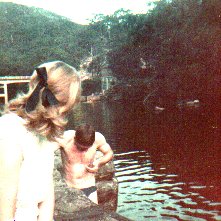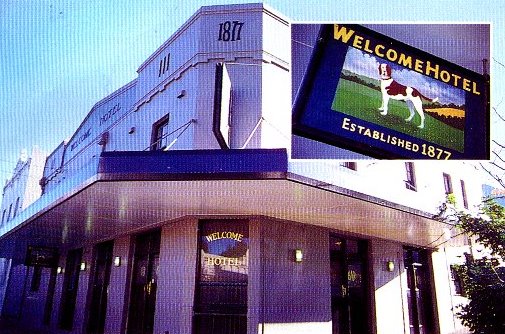|
|
||||||||||||||
|
|
Radschool Newsletter |
Vol 7 Page 8 |
||||||||||||
|
|
||||||||||||||
|
Wines and Stuff. John Morley.
|
||||||||||||||
|
Storing wine.
Last issue we talked about aging wine, now let’s talk about how or where to store, or cellar wine while it’s aging. Like everything else associated with wine, there’s a bunch of variables involved here also. If the wine you’re trying to cellar is a wine that is meant to be drunk within a year or so, you probably don't have to keep it in any really special place other than it should be stored in a relatively cool place and out of the light.
For wines that should be aged for a number of years you should select a storage space, or cellar, with the following conditions:
Temperature. Your cellar should be a place that does not have rapid temperature fluctuation. Ideally, a constant temperature of between 10—15 degrees C is ideal. Wide swings in temperature will harm the wine. Having too high a temperature will age the wine faster so it won't get as complex as it might have. Having too low a temperature will slow the wine's maturation.
Humidity. The ideal humidity is about 60 percent. You might think that humidity doesn’t matter as wine is kept in a bottle, and how could humidity affect its storage. Well, if the humidity is too low (dry air) the cork can dry out and shrink and allow air into the bottle which will oxidize the wine. This is why bottled wine is stored on its side as the wine will help to keep the cork moist.
Lack of light. It doesn’t have to be pitch dark, but avoid a storage space with strong sun or natural light as sunlight will bleach the colour—especially reds..
Lack of vibration. Obvious. You wouldn’t store your wine in a place where it could be shaken to bits.
Lack of strong odours. Once again obvious. You wouldn’t store your wine in an abattoir. Strong odours stand a good chance of getting through the cork and into the wine.
Some people will say that the temperature rule is not important, and that a large variation in temperature does not affect a stored wine. They reckon that a slow temperature swing from relatively cold to relatively warm (but not really hot) does not drastically affected the wine. Nevertheless, consistently storing wine at warm temperatures is going to age it faster and breaking the other rules probably isn't going to help much either.
Drinking.
Now that we know how to store our wine, what is the ideal temperature that the wine should be when we drink it. If we’re talking about a red, most people say that it should be drunk at room temperature. But, is that Townsville’s room temperature or Hobart’s room temperature.
Wine should be drunk at a temperature that is always below room temperature because, as a wine warms it gives off vapours, and as smell is a big part of taste, getting the right aroma into the nose is important. A rough rule of thumb is:
Corks
Most "corks" are made of cork, though more and more bottlers are using plastic corks as natural cork is troublesome. The prime reason for the cork is to keep what’s in the bottle in, and to keep what’s outside the bottle out, and as long as it does that, without tainting the wine, (which is one of its biggest problems) it doesn’t really matter what it’s made of.
Technically, the screw cap is the best seal, though I don’t think we’ll ever see a Grange with a screw cap. But whatever the cork’s made of, before you can drink the wine you’ve got to get it out of the bottle.
There are all sorts of cork screws, possibly the most awkward is the one the wine waiters use in restaurants. The only reason it’s used is to give an impression of professionalism. There’s the one where you wiggle two metal prongs down each side of the cork then pull—also hard to use. There’s one that you screw into the cork, and when it hits bottom it reverses itself and as you continue to screw it pulls the cork out. Another uses air pressure, it has a sharp needle that you pass through the cork and pump air into the bottle which “pops” the cork. Do not use this type of opener without first reading the safety warning.
The easiest, and cheapest of the lot is the one that has two levers that rise as the screw goes into the cork. When you pull the levers down the cork comes out.
Next week—we’ll talk about ordering wines in restaurants.
|
||||||||||||||
|
||||||||||||||
|
Blue Silk.
A recent issue that contained a photo of Graham Silk, known to all as “Blue”, bought a few requests asking if we knew where “that old bastard” was these days. We’ve managed to track him down, and these days Blue and Erin live in the Blue Mountains behind Sydney, and we’re glad to be able to say that they are both fit and well.
Like most of us, Blue didn’t continue with the trade he learnt in
the RAAF, instead he chose to pursue the vocation he learnt so well
at the ASCO canteen at Richmond. Anyone who was at Richmond during
the mid to late 60’s will i
Blue Silk, after a swim in the cold Hawkesbury River at Bowral Waters in 1967, shown here checking to see if everything is still in working order while anxious (at the time) girl friend Erin looks on.
He and Erin bought the Grand View Hotel in Wentworth Falls, and ran that for 16 years, and developed it into one of the better spots west of Sydney. They sold the Grand View and bought a restaurant in Leura, turning it into the five star “Silks Brasserie”. Silks, which is at 148 The Mall in Leura, has been continuously voted as one of the best in the state, and was recently entered into the American Express Hall of Fame. The Restaurant has become so well known that large numbers of people make the 2 hour run from Sydney every week-end to sample both the wonderful cuisine and Blue’s unique form of hospitality.
Blue doesn’t run the kitchen any longer, instead he’s recruited several of the top chefs from down in Sydney, and coaxed them up to the mountains.
Not content with one first class establishment to run, Blue and Erin
bought the Welcome Hotel in Roselle in 1998, and their
eldest son Damien was conscripted into running and revamping the old
hotel. Blue says there is no truth in t
The menu at the Welcome is contemporary European with a distinctly Irish influence. It’s true you can’t get a Welsh Rarebit, but the available menu more than compensates for this unforgivable oversight.
Blue Silk today—pictured at “Silks Brasserie” in the Blue Mountains.
We recently read an excellent article on the Brasserie in the Volvo Magazine which is a magazine sent to owners of Volvo cars, and we thought “Oh no—it can’t be!!!” They must have got it wrong. We had instant mind images of a yellow 244 with two white hats on the back sill, parked in front of the Leura Bowls Club, but thankfully, we were wrong.
The blue Healey might have gone, but it has been replaced with a couple of the smarter Volvos—a black S70 and a black sporty S40 T4. If ever you are up in the Blue Mountains, Blue and Erin would love to see you—why not call in. They’re open for lunch from noon to 3.30 pm then again from 6-11.30 pm—7 days a week. And remember, you’re always welcome at the Welcome!! |
||||||||||||||
|
|
||||||||||||||
|
The Welcome Hotel, 91 Evans Street, Roselle. NSW. |
||||||||||||||
|
Story has it that back in the late 1870’s, a young bloke named Tom and his foxhound named Winston left London for NSW, but became separated when they arrived at the busy docks in Sydney. Winston roamed around Sydney looking for a feed and a place to call home and upon hearing the merriment coming from the pub in Evans St, decided to give it a try. The publican at the time welcomed him, and that supposedly is how the hotel got its name. |
||||||||||||||
|
|
||||||||||||||
|
|
||||||||||||||



